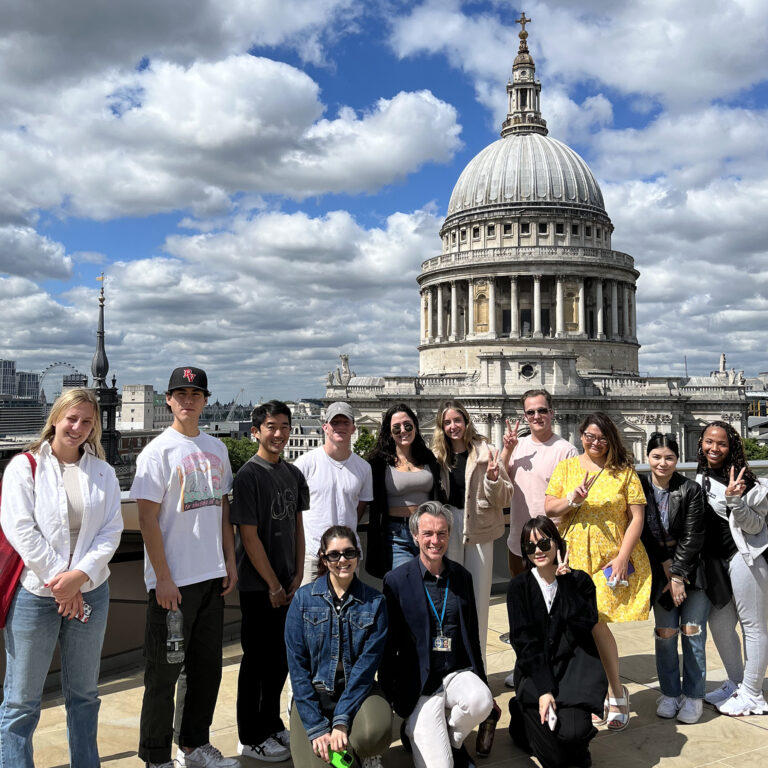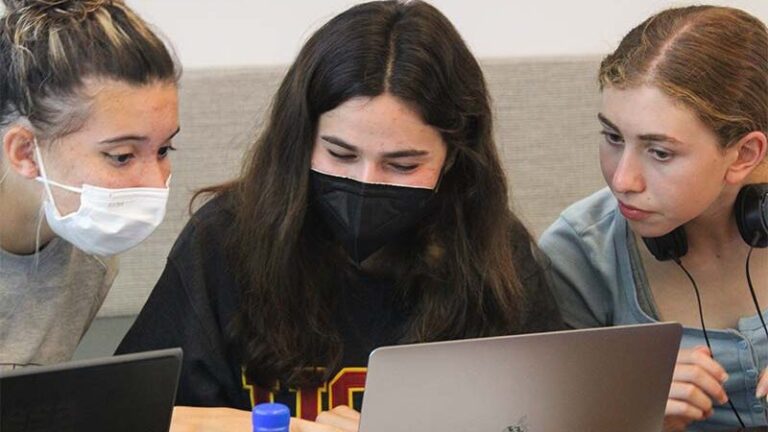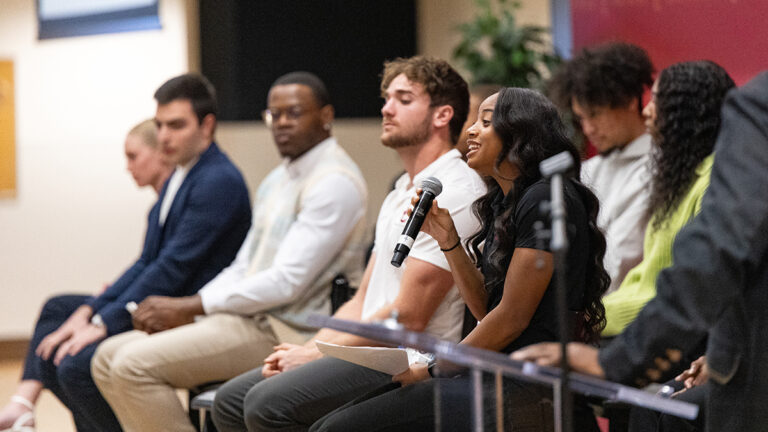
Track and field standout Jalaysiya Smith shares a story. (USC Photo/Drake Lee)
‘Stronger Than Hate’: USC Student-Athletes Reflect on Trips to Auschwitz, Selma
USC Shoah Foundation and the Big Ten Conference sponsored the students’ visits to historical sites of the Holocaust and the Civil Rights Movement.
When reflecting on a visit to the Auschwitz-Birkenau State Museum, Jack Carter, a member of the USC track and field team, vividly recalled crying as he turned the pages of a massive book filled with names, dates of birth and places of death. For about 10 minutes, he said, he turned pages while sobbing.“I remember my hand was on a girl’s name, and she was born April 5, the same birthday as me, and I just broke down again, just at this little human connection,” Carter told the audience assembled in the Founders Room at the Galen Center last week. “It was the most emotional I’ve ever been in my entire life — it’s a level of human connection you couldn’t have gotten from AP U.S. History.”Clark was part of a panel of Trojan student-athletes who shared their experiences as part of “Stronger Than Hate: Student Athletes as Agents of Change,” a presentation and discussion of their recent visits to historical sites of the Holocaust and the Civil Rights Movement.
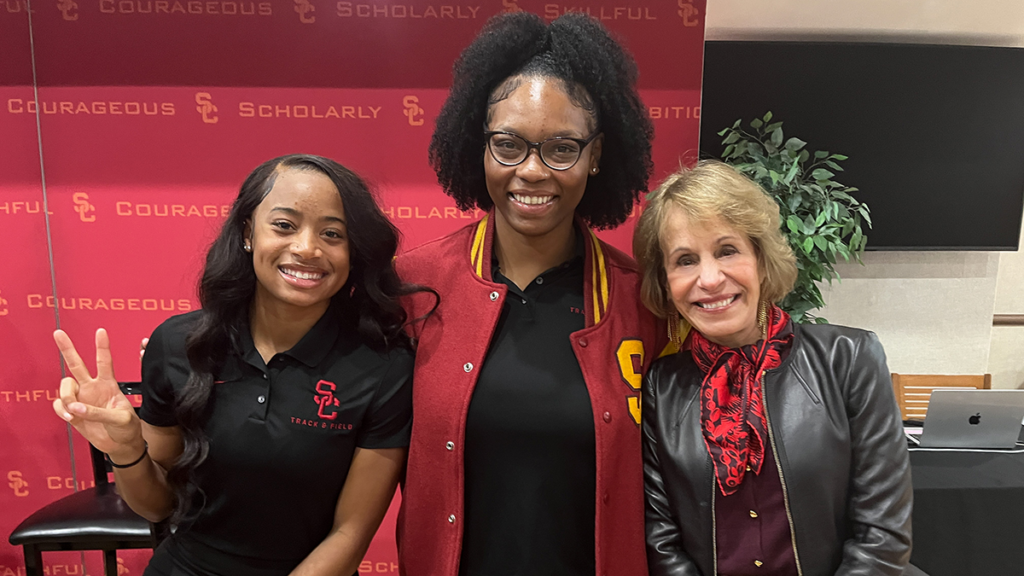
USC Shoah Foundation — The Institute for Visual History and Education sponsored the trip to Poland as part of its Leadership Summit, sending Trojan student-athletes to not only bear witness to these infamous sites, but also to connect with academics who specialize in Holocaust studies. The Big Ten Conference sponsored journeys to Selma, Ala., and Montgomery, Ala., as part of its “Big Life Series.” The goal is the same: to empower student-athletes to be strong leaders against all forms of hate and bigotry.
Whether they were across the country or across the ocean, these students shared a deeper understanding of their role in creating a more just and humane world. For USC President Carol Folt, that desire to learn more about the painful history of our world shows an innate desire to create a better one.
“One of the students I heard from said, ‘We’re all witnesses now,’ and I think that’s a wonderful way to think of it,” Folt said. “If we witness it, we won’t forget it. We’ll carry it and we’ll think how to use that, how we have a responsibility to bear that witness and use that as we go forward.”
Stronger Than Hate: Remembering those lost
Of the students at the event who visited Poland last summer, all spoke about the size of Auschwitz, comparing its size to that of the USC University Park Campus. It’s that comparison that further helped the students connect with their surroundings.
“It was bigger than anything that you can even imagine through just reading and learning about it in history classes,” said Dilan Johnson, a former member of the USC rowing team. “It’s more than just all these statistics and all these stories that we’ve heard about our entire lives.”
Robert Williams, executive director of the USC Shoah Foundation, spoke about the importance of studying these atrocities, and how that resonates in the way we combat all hate.
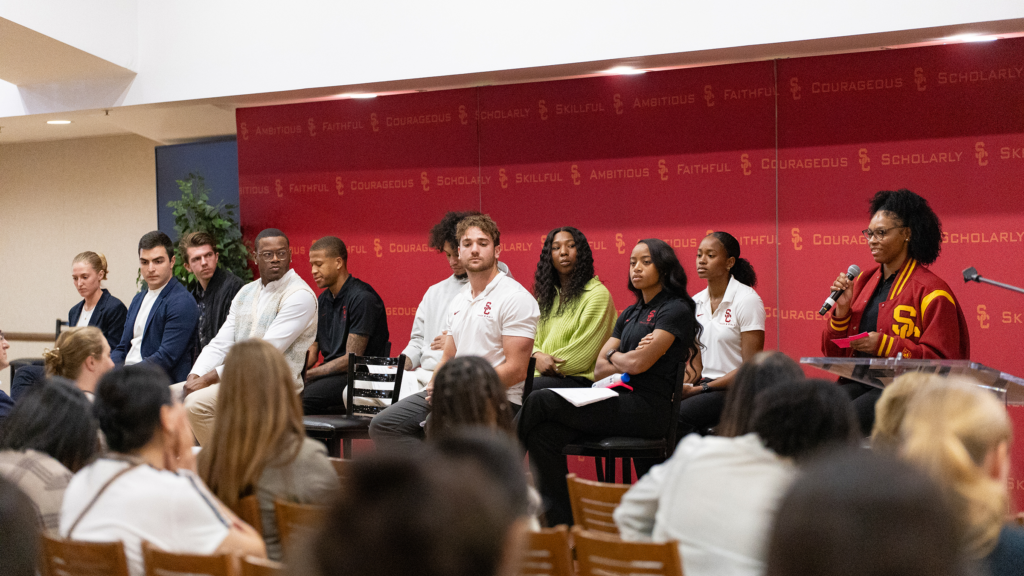
“Part of the reason we started in Krakow was to show 1,000 years of Jewish life and culture so that we could understand what was lost during the Holocaust, but also understand that communities can rebuild, and they can do so in harmony with their once aggressors, perpetrators and enemies,” Williams said. “This is essential — this provides the foundation for healing that we can all work from.”
Marching in the footsteps
When Koi Love walked through the streets of Selma last summer, she gained a clearer picture of what that small town means in the history of our country. The junior on the USC women’s basketball team walked where civil rights leaders like the Rev. Martin Luther King Jr. and U.S. Rep. John Lewis marched for equality nearly 60 years ago. She stood in the place where countless demonstrators and protesters were beaten by police on their march to the state capitol in Montgomery.
“As we entered Selma, you just felt our entire bus get quiet, and you could understand immediately how important Selma is and how much history it holds,” Love said. “The experience made me think that I absolutely have to give back to this place, to these people, whether it’s telling their stories or just being the best that I can be.”
Jalaysiya “Laysi” Smith, a junior on the USC track and field team, recalled visiting The Legacy Museum in Montgomery and seeing a wall of victims of racial injustice — a moment that put her own experiences into perspective.
“We think there are problems today, and there still are so many, but they’re so minute compared to the things those people experienced,” Smith said. “Once you look at those faces and see just a sea of eyes, you realize that you’ll never be able to understand.”
For all students, the visit to Selma and Montgomery was an eye-opening experience, but for some — specifically those from the South — it was a sobering homecoming.
“It was an honor to be recommended to be a part of this program,” said Garrison Madden, a redshirt freshman on the USC football team and native of Hampton, Ga. “Being from the South, I’ve learned about the Civil Rights Movement and the people that have been a part of it, so I couldn’t pass up an opportunity to learn more about not only African American history, but our world’s history.”
